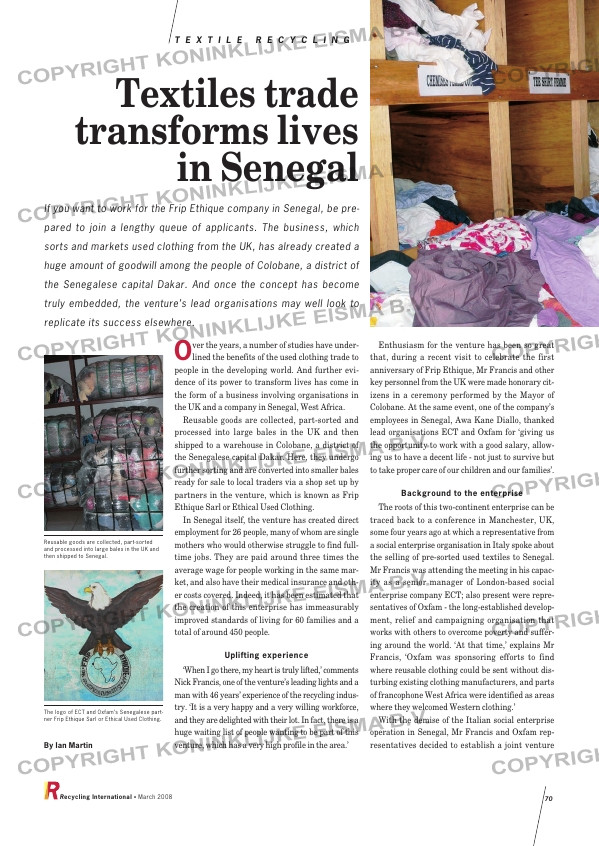Page 70 from: March 2008

Over the years, a number of studies have under-lined the benefits of the used clothing trade to
people in the developing world. And further evi-
dence of its power to transform lives has come in
the form of a business involving organisations in
the UK and a company in Senegal, West Africa.
Reusable goods are collected, part-sorted and
processed into large bales in the UK and then
shipped to a warehouse in Colobane, a district of
the Senegalese capital Dakar. Here, they undergo
further sorting and are converted into smaller bales
ready for sale to local traders via a shop set up by
partners in the venture, which is known as Frip
Ethique Sarl or Ethical Used Clothing.
In Senegal itself, the venture has created direct
employment for 26 people, many of whom are single
mothers who would otherwise struggle to find full-
time jobs. They are paid around three times the
average wage for people working in the same mar-
ket, and also have their medical insurance and oth-
er costs covered. Indeed, it has been estimated that
the creation of this enterprise has immeasurably
improved standards of living for 60 families and a
total of around 450 people.
Uplifting experience
‘When I go there, my heart is truly lifted,’ comments
Nick Francis, one of the venture’s leading lights and a
man with 46 years’ experience of the recycling indus-
try. ‘It is a very happy and a very willing workforce,
and they are delighted with their lot. In fact, there is a
huge waiting list of people wanting to be part of this
venture, which has a very high profile in the area.’
Enthusiasm for the venture has been so great
that, during a recent visit to celebrate the first
anniversary of Frip Ethique, Mr Francis and other
key personnel from the UK were made honorary cit-
izens in a ceremony performed by the Mayor of
Colobane. At the same event, one of the company’s
employees in Senegal, Awa Kane Diallo, thanked
lead organisations ECT and Oxfam for ‘giving us
the opportunity to work with a good salary, allow-
ing us to have a decent life – not just to survive but
to take proper care of our children and our families’.
Background to the enterprise
The roots of this two-continent enterprise can be
traced back to a conference in Manchester, UK,
some four years ago at which a representative from
a social enterprise organisation in Italy spoke about
the selling of pre-sorted used textiles to Senegal.
Mr Francis was attending the meeting in his capac-
ity as a senior manager of London-based social
enterprise company ECT; also present were repre-
sentatives of Oxfam – the long-established develop-
ment, relief and campaigning organisation that
works with others to overcome poverty and suffer-
ing around the world. ‘At that time,’ explains Mr
Francis, ‘Oxfam was sponsoring efforts to find
where reusable clothing could be sent without dis-
turbing existing clothing manufacturers, and parts
of francophone West Africa were identified as areas
where they welcomed Western clothing.’
With the demise of the Italian social enterprise
operation in Senegal, Mr Francis and Oxfam rep-
resentatives decided to establish a joint venture
T E X T I L E R E C Y C L I N G
Recycling International • March 2008 70
If you want to work for the Frip Ethique company in Senegal, be pre-
pared to join a lengthy queue of applicants. The business, which
sorts and markets used clothing from the UK, has already created a
huge amount of goodwill among the people of Colobane, a district of
the Senegalese capital Dakar. And once the concept has become
truly embedded, the venture’s lead organisations may well look to
replicate its success elsewhere.
By Ian Martin
Textiles trade
transforms lives
in Senegal
Reusable goods are collected, part-sorted
and processed into large bales in the UK and
then shipped to Senegal.
The logo of ECT and Oxfam’s Senegalese part-
ner Frip Ethique Sarl or Ethical Used Clothing.
RI_040 Textiles Senegal:Opmaak 1 28-02-2008 11:52 Pagina 70



